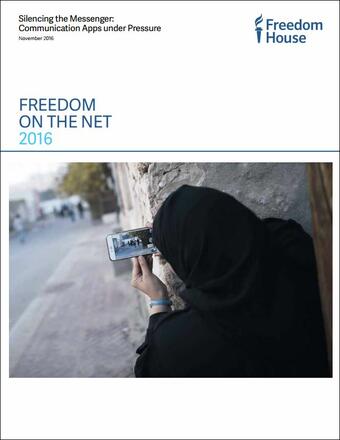
Freedom on the Net 2016
According to the report, in the past year, social media platforms, communication apps, and their users faced greater threats than ever before in an apparent backlash against growing citizen engagement, particularly during politically sensitive times. Of the 65 countries assessed, governments in 24 impeded access to social media and communication tools, up from 15 the previous year. Governments in 15 countries temporarily shut down access to the entire internet or mobile phone networks, sometimes solely to prevent users from disseminating information through social media. Meanwhile, the crackdown on users for their activities on social media or messaging apps reached new heights as arrests and punishments intensified.
The report provides very informative tables, charts and graphs on Freedom of the Net (FOTN) score declines, tracking restrictions on apps, global Internet population by 2016 FOTN status, censored topics by country, key Internet controls by country, countries with largest five-year declines, distribution of global internet users by country and FOTN Status, global Internet user stats, FOTN world map, 65 country score comparison, score comparison by region. The report also discusses Internet Freedom vs. Press Freedom, Internet Freedom vs. Internet Penetration vs. GDP and provides an Overview of Score Changes.
The report states that Internet freedom has declined for the sixth consecutive year, with more governments than ever before targeting social media and communication apps as a means of halting the rapid dissemination of information, particularly during antigovernment protests.
It stresses that public-facing social media platforms like Facebook and Twitter have been subject to growing censorship for several years, but in a new trend, governments increasingly target messaging and voice communication apps such as WhatsApp and Telegram. These services are able to spread information and connect users quickly and securely, making it more difficult for authorities to control the information landscape or conduct surveillance. China is presented as the year’s worst abuser of internet freedom.
Tags: Media freedom Online news Online media Censorship Cybersecurity Digital rights Freedom of expression Media pluralismThe content of this article can be used according to the terms of Creative Commons: Attribution-NonCommercial 4.0 International (CC BY-NC 4.0) . To do so use the the wording "this article was originally published on the Resource Centre on Media Freedom in Europe" including a direct active link to the original article page.

